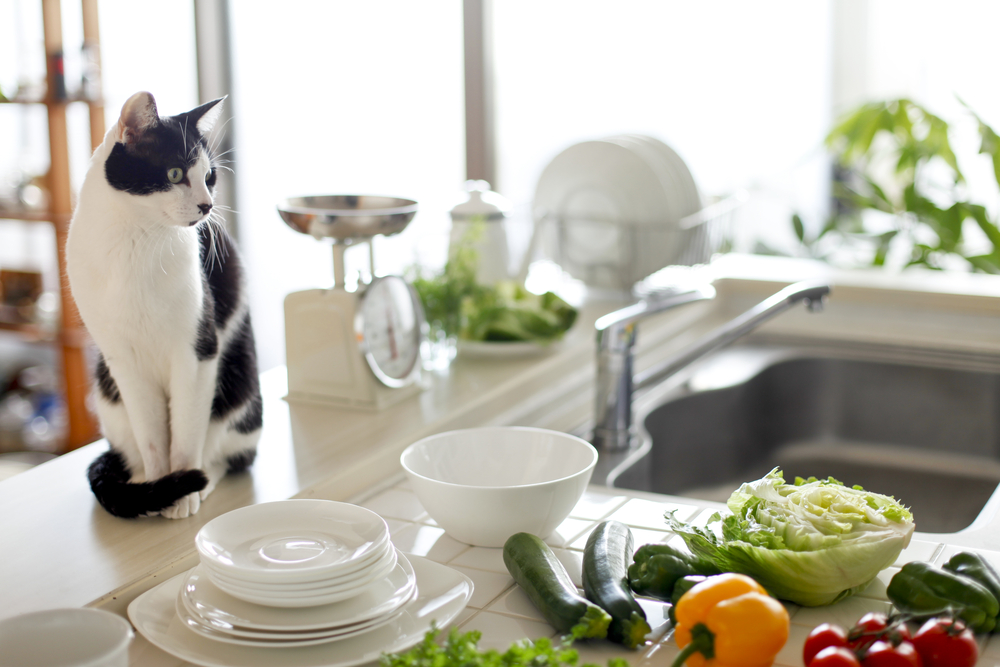The mischievous nature of pets, especially young puppies and kittens, can provide endless entertainment and laughs for pet owners, but it also can get your four-legged companion in trouble. Pets explore their environments by tasting, smelling, and occasionally pawing any new, interesting objects or foods they encounter. However, many household items, foods, or products are toxic to pets, and can be deadly in some cases. Our Oliver Animal Hospital team wants to ensure your four-legged companions are protected, and we describe five common household pet toxins.
#1: Human food and pets
Pets are skilled at guilting their owners into providing an extra treat or snack. However, feeding your pet table scraps or human foods can cause gastrointestinal distress, including painful pancreatitis. Pancreatitis is a potentially deadly inflammatory condition that can cause vomiting, diarrhea, lethargy, and dehydration. Additionally, certain human foods can cause kidney failure, hypothermia, life- threatening anemia, seizures, or heart failure. In fact, the ASPCA Animal Poison Control Center (APCC) receives more than 70 calls daily concerning chocolate toxicity, and more than 13% of all calls are food-related toxicities. Common toxic foods and beverages include:
- Citrus
- Coconut water
- Chocolate, especially dark or baker’s chocolate
- Coffee or caffeinated foods
- Grapes and raisins
- Sugar-free sweets (and some peanut butters) that contain xylitol
- Macadamia nuts
- Onions, garlic, chives, and leeks
- Salt or salty snacks (i.e., salted pretzels, potato chips)
- Alcoholic beverages or alcohol-flavored foods
- Raw meat or eggs
#2: Medications and pets
Many over-the-counter (OTC) and prescription medications are the culprit for unexpected emergency veterinary visits, and in 2020, the APCC reported that more than 17% of calls were attributed to OTC medications. Never treat your pet’s pain or discomfort with any medications without consulting your veterinarian first. Bring your pet in for immediate veterinary care if they ingest any of the following substances:
- OTC medications — Popular pain medications, such as ibuprofen, acetaminophen, naproxen, and joint rubs, can lead to kidney failure in pets. Many herbal supplements, including vitamins, also contain pet-toxic ingredients.
- Prescription medications — Store all medications out of paw’s reach, because childproof lids do not necessarily mean they are pet-proof. Common culprits for poisoning include heart, ADHD, thyroid, blood pressure, anti-anxiety, and antidepressant medications.
- Veterinary medications — Many veterinary medications are flavored to ensure pets don’t resist taking them. However, a pet may mistake them for treats, which can lead to an overdose. Store all pet medications out of reach, and never store them in bags or purses where pets may seek them out.
#3: Home improvement products and pets
The COVID-19 pandemic led to many people working remotely and embarking on home improvement projects. Enhanced cleaning practices also increased pets’ exposure to dangerous chemicals. Ensure your pet does not have access to paints, spackles, adhesives, or any cleaning chemicals. Additionally, thoroughly rinse cleaning products off surfaces where pets may walk, including countertops, to avoid chemical injuries to paws, or ingestion during grooming.
#4: Toxic plants and pets
Many popular ornamental plants and flowers are dangerous when ingested by pets. Always check the APCC plant list to ensure any plant you are adding to your home or garden is safe to have around your pet. Additionally, fertilizers, especially organic fertilizers, can be irresistible to pets, but many contain herbicides or soil enhancements that are dangerous. Call your veterinarian or the APCC if your pet ingests any part of a toxic plant, including:
- Daffodils
- Tulips
- Lilies
- Angel trumpet
- Lily of the valley
- Oleander
- Sago palm
#5: Pest control chemicals and pets
It is not uncommon for unwelcome houseguests, such as insects and rodents, to seek shelter or food in your home. However, many popular rodenticides and pesticides contain ingredients that are as appealing to your pet as they are to the unwanted pests, and the chemicals in these products can be deadly to pets. Consider consulting a pest control professional regarding pet-safe options for unwanted pests.
Pet toxicity signs

Toxicity signs in pets may not be immediately obvious, and often depend on the amount and type of toxin ingested. Bring your pet in for a veterinary examination if they are exposed to any potential toxin, or show any of the following signs:
- Excessive drooling
- Decreased appetite
- Changes in thirst or urination
- Vomiting and diarrhea
- Weakness or collapse
- Lack of coordination
- Seizures or muscle tremors
- Pale, yellow, or bright red gums
- Difficulty breathing
- Bleeding from any orifice
Call our Oliver Animal Hospital office immediately if you see your pet ingesting a toxic substance, or if they are showing toxicity signs. Our world-class veterinary team is here to help.







Leave A Comment